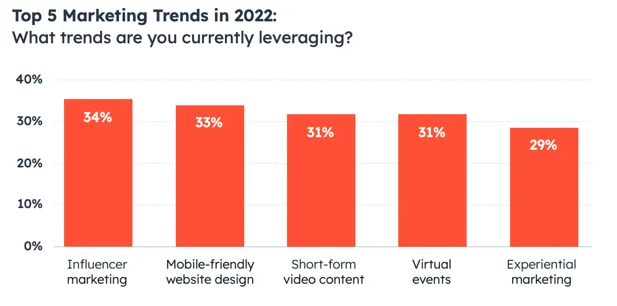Crypto marketing is just like any other field; it requires careful planning. When you create an outstanding marketing strategy, you set yourself up for success. Here’s how to create a winning crypto marketing plan.
Understanding cryptocurrency marketing

Crypto marketing attempts to boost user engagement and encourage increased adoption of crypto-related products. In concept, it is similar to traditional marketing. However, in practice, there are a number of core differences.
Web3 users tend to be more cognizant of their personal data, making them more likely to resist personalized ads. As a result, many crypto marketing strategies will often focus on soft-selling products.
In addition, many platforms heavily scrutinize or outright ban financial or cryptocurrency ads. This means that marketers are tasked with finding a way to generate leads using alternative methods.
Lastly, the biggest difference between traditional and crypto marketing are the channels utilized. Crypto enthusiasts tend to flock to certain platforms more than others — e.g., Twitter, Discord, Telegram. For that reason, marketers must migrate to where the people are in order to generate leads.
The importance of a marketing plan for your crypto startup

The world is becoming more digital, not less. As shown in the image above, many companies are planning to increase spending on marketing strategies. If you want to keep up, you will have to do the same. Without a marketing plan, you risk wasting time, effort, and resources.
Additionally, many businesses have entered the market without fully understanding the barriers they might face. For every business that does not have a strategy for bootstrapping its business, there is one that will.
Crypto marketing puts your products and services in front of the people that want them, need them, and are most likely to use and pay for them. It is a way to reach a targeted audience most cost-effectively.
To get help with marketing your web3 startup, contact our team of experts here.
A step-by-step guide to creating your crypto marketing plan
Market research
Market research refers to the process of gathering, analyzing, and interpreting data about a specific market, industry, or target audience. It is a systematic approach used to understand various aspects of the market, such as customer preferences, behaviors, trends, and competition.
Market research helps organizations make informed business decisions, develop effective marketing strategies, identify opportunities, and mitigate risks to maintain a competitive edge in the market. There are multiple ways that you can break down research.
Qualitative research focuses on understanding public opinion and delves into the market’s sentiments toward existing products within a particular industry. It aims to uncover subjective insights and perceptions through techniques such as interviews, focus groups, and observational studies.
On the other hand, quantitative research is centered around data analysis and seeks to identify meaningful patterns and trends within the information gathered from public records and other numerical sources. By employing statistical and mathematical methods, quantitative research provides objective and measurable data for decision-making purposes.
You can categorize research even further into primary and secondary research. However, the most important takeaway is that different types of market research yield a particular type of information.
Identifying target audience
Identifying your target audience is important in creating a crypto marketing plan. Startups typically have limited resources, including time, budget, and manpower. When you identify your target audience, it helps you focus your marketing efforts and resources on the specific group of people who are most likely to be interested in your product or service.
Some proven methods to identify, utilize, and maintain your target audience are:
- Interviews: Useful for understanding consumer needs, identifying pain points, and obtaining qualitative feedback on products, services, or marketing strategies.
- Surveys: Useful for collecting both quantitative and qualitative data on various, such as customer satisfaction, market trends, purchasing behavior, and brand perception, and gathering feedback on specific products or services
- Focus groups: Useful for understanding group dynamics, uncovering shared opinions, exploring product or service perceptions, and generating ideas for improvement.
- Pricing research: Helps businesses determine optimal pricing strategies. It provides insights into customers’ willingness to pay, price sensitivity, perceived value, and competitive pricing analysis. It is useful for setting competitive prices, maximizing profits, and positioning products or services effectively.
- Competitor analysis: Provides information about market share, pricing strategies, marketing campaigns, product features, and customer perception of competitors.
- Customer satisfaction and loyalty: Provides insights into areas of improvement, identifies drivers of customer satisfaction, and helps in building long-term customer relationships.
- Market segmentation: Helps businesses identify target markets, understand customer needs within each segment, tailor marketing messages, and develop targeted strategies for better market penetration.
- Buyer persona: Useful for developing targeted marketing strategies, creating tailored products or services, and improving customer engagement.
Pro tip: Buyer personas should provide insights into the motivations, needs, and pain points that drive individuals to purchase a product or service, rather than focusing on describing character traits.
Setting marketing goals
Marketing goals serve as a compass, guiding businesses toward success. Without defined goals, businesses risk drifting aimlessly, lacking direction and purpose in their crypto marketing efforts. They enable businesses to measure progress, identify areas of improvement, and make necessary adjustments along the way.
One goal that you can set is lead generation. Leads are potential customers or individuals who have expressed interest in a product or service and can be nurtured into becoming paying customers. You can also keep track of the rate at which you acquire new customers, the cost of acquiring each lead, and the cost of maintaining a lead over time.
Another goal you can measure is increased website traffic. Measuring website traffic involves tracking and analyzing various metrics to gain insights into the bounce rate, number of visitors, their behavior, and interactions on a website, providing valuable information for evaluating website performance and effectiveness.
Additionally, engagement is a way to measure the activity of a cultivated community. It is especially useful for community growth on social media. Lastly, increased revenue is perhaps the most obvious marketing goal. Naturally, you will want to keep track of revenue to keep your business afloat.
Crafting your brand message
Brand messaging refers to how your company communicates its value proposition, personality, and unique competitive advantages through various channels. The aim is to ensure consistent and compelling storytelling that resonates with your target audience.
Many factors go into crafting a good brand message. The most important thing to remember is to communicate what problem your product or service solves and how it does so.
To do this, you must understand your target audience. Crafting your mission, vision, and core values is also a good idea. This gives potential leads the opportunity to identify with your startup on a deeper level. When people can identify with you on a more personal level, they are more likely to hear what you have to offer.
Selecting marketing channels
As stated earlier, crypto marketing tends to use certain channels for marketing more than others. Assess your resources, including budget, manpower, and expertise, as different channels may require varying levels of investment and skill. For example, for most businesses, social media marketing is probably more realistic for marketing than using tv ads.
The most common channels for marketing in crypto are Discord, Twitter, Telegram, and YouTube. Some businesses also use Instagram and Facebook; however, most marketing agencies tend to focus on the former options for community building in crypto.
It is important to note that the cost of implementing an effective campaign may differ on each platform. Efficient video marketing on YouTube may cost more than Twitter marketing. Likewise, Discord community management may cost more than Telegram marketing.
Budgeting
One way to establish your marketing budget is by reviewing your annual revenue sheets and allocating a percentage of it specifically for marketing purposes. In general, business-to-business (B2B) companies dedicate between 2% and 5% of revenue to marketing. On the other hand, business-to-consumer (B2C) companies typically allocate a higher proportion, ranging from 5 to 10%.
You may also take a look at how much competitors spend on their marketing budget to determine how much you will spend. After that, you can split up the budget by platforms with the highest return on investment (ROI), cost per new user, and any other metric that makes sense.
You could also allocate it to a crypto marketing agency. Depending on the implementation, it may be cheaper. For example, suppose you are community building in crypto. In that case, it may be cheaper and more effective to hire an agency instead of setting aside a large salary for a dedicated employee for community management.
Implementing the plan
Implementing the marketing plan requires the assembly of a skilled and dedicated marketing team that can effectively execute strategies and achieve the desired goals. A successful marketing team consists of individuals with diverse expertise and complementary skills working together towards a common vision.
First and foremost, it is important to have a marketing leader or manager who can provide guidance, set objectives, and oversee the team’s activities. This person should possess strong leadership qualities, strategic thinking abilities, and a deep understanding of crypto marketing principles.
Next, the team should include specialists in various areas such as branding, content creation, digital marketing, social media, SEO, advertising, public relations, and analytics.
Each team member brings their unique expertise to the table, ensuring that all aspects of marketing are covered comprehensively. You should already have key performance indicators (KPIs) in place for your team so that they know what is expected of them.
Measuring success
When measuring the success of marketing efforts, several key metrics can provide valuable insights into the effectiveness and impact of your strategies. By tracking and analyzing these metrics, businesses can gain valuable insights into the performance of their marketing activities, make data-driven decisions, and optimize their strategies for improved results and long-term success.
Examples
- ROI: ROI measures the profitability of your crypto marketing campaigns by comparing the revenue generated against the cost incurred. It helps determine the efficiency and financial viability of your marketing initiatives.
- Conversion rate: This rate measures the percentage of website visitors or leads that take the desired action, such as making a purchase, filling out a form, or subscribing to a newsletter. It indicates how effective your marketing efforts are in driving desired outcomes.
- Customer Lifetime Value (CLV): CLV quantifies the total value a customer brings to your business over their lifetime. It considers factors such as repeat purchases, average order value, and customer retention. Tracking CLV helps gauge the long-term profitability of your customer base.
- Website analytics: Website analytics provides insights into various aspects of your website’s performance, including the number of visitors, page views, bounce rate, time on site, and conversion funnels. Analyzing these metrics helps understand user behavior and identify areas for optimization.
- Social media engagement: Social media metrics, such as likes, shares, comments, and follower growth, measure the level of engagement and interaction with your brand on social platforms. They indicate the resonance of your content and the strength of your online community.
- Email marketing metrics: Email marketing metrics include open rate, click-through rate, conversion rate, and unsubscribe rate. These metrics assess the effectiveness of your email campaigns in capturing attention, generating interest, and driving action.
- Brand awareness: Measuring brand awareness involves tracking metrics such as brand mentions, reach, and sentiment analysis. It helps assess how well your brand is known and perceived in the market.
- Customer satisfaction: Customer satisfaction can be measured through surveys, feedback forms, or Net Promoter Score (NPS). It helps gauge customer loyalty, overall satisfaction levels, and areas where improvements are needed.
Best marketing strategies for cryptocurrency startups

SEO for cryptocurrency
In summary, effective SEO strategies for cryptocurrency startups involve thorough keyword research, building high-quality backlinks, and optimizing technical aspects of the website. By implementing these strategies, startups can increase their online visibility, attract targeted traffic, and establish a strong online presence in the competitive cryptocurrency industry.
Pro tip: Google updates its SEO algorithm several times per day. So, SEO is more of a constant process than a one-off.
Social media marketing
Overall, social media marketing is a powerful tool for cryptocurrency startups to establish their brand, engage with the community, and drive growth. To aid in social media marketing, use tools like:
- CapCut
- HootSuite
- SproutSocial
- Mention
- Social Blade
By selecting the right platforms, creating compelling content, actively participating in relevant communities, and utilizing social media advertising, startups can effectively leverage social media to achieve their marketing objectives and stay ahead in the competitive cryptocurrency landscape.
Influencer marketing
Influencer marketing provides cryptocurrency startups with a powerful means to reach their target audience, build trust, and drive user adoption. By identifying relevant influencers, fostering authentic relationships, exploring collaboration opportunities, and tracking campaign performance, startups can leverage the influence of key individuals to propel growth in the competitive crypto industry.
When partnering with influencers, consider various collaboration options such as sponsored content, guest blog posts, video collaborations, or social media takeovers. To maximize the impact of influencer marketing, consider using tools such as:
- Upfluence
- NeoReach
- BuzzSumo
- Ninja Outreach
- Klear
Content marketing
Content marketing is a strategic approach that focuses on creating and distributing valuable, relevant, and consistent content to attract and engage a target audience. Create a content strategy that aligns with your marketing goals. Identify content themes, formats (e.g., blog posts, videos, infographics), and distribution channels to ensure consistency and maximize reach.
Provide educational and informative content that helps your audience understand the benefits of your particular offering.
Focus on creating value and establishing your startup as a trusted source of information. Position your startup as an industry thought leader by sharing expert insights, analysis, and predictions. Publish thought-provoking content that contributes to industry conversations and demonstrates your expertise. Most of all, make sure the content is relevant to the audience.
Public relations
Public relations plays a vital role in shaping public perception, building credibility, and driving awareness for cryptocurrency startups. In this case, build relationships with journalists, reporters, and influencers covering the cryptocurrency industry.
Proactively contact relevant media outlets to secure media coverage, interviews, and guest articles. Offer expert insights, data, or thought leadership to position your startup as a go-to source for industry news and commentary. You should also engage with the cryptocurrency community through various channels such as social media, forums, and online communities.
Most importantly, be prepared to address and manage potential crises or negative situations effectively. Develop a crisis management plan that outlines protocols for handling media inquiries, managing social media backlash, and communicating transparently with stakeholders during challenging times.
Community building
Community building is a strategic approach to cultivating and nurturing a loyal and engaged community around your cryptocurrency startup. The most important part is creating a sense of belonging, fostering meaningful interactions, and providing value to community members.
Depending on the platform, there are many approaches to maintaining a robust community. For example, on Telegram and Discord, you can use bots to manage mundane tasks, such as greeting new members and distributing community guidelines.
Keep in mind that you can also acknowledge and appreciate active community members who contribute positively. This can be through public recognition, exclusive perks, early access to new features, or loyalty programs. You should also engage in active communication, encourage user-generated content, and host virtual or in-person events.
By implementing these best practices, cryptocurrency startups can cultivate a vibrant and engaged community that supports continued growth and success.
Hiring a cryptocurrency marketing agency: Pros and cons

When it comes to marketing a cryptocurrency project or startup, hiring a specialized cryptocurrency marketing agency can offer several advantages and considerations. These agencies are equipped with industry-specific knowledge, expertise, and resources to help navigate the cryptocurrency landscape. However, like any business decision, there are pros and cons to consider.
The most obvious benefit is the time and effort that you save when you are just starting out. When you are not aware of the best practices in marketing, it can create a high barrier to entry. In addition to marketing, depending on your product or services, the agency may aid in services such as:
- Web and app development
- White-label exchange services
- White-label launchpad services
- UX and UI optimization
- Blockchain and token development
However, the downside to using an agency is that it is easy to rack up a large tab. For example, if you want to build and market an exchange, you could easily come out to spending half a million dollars. Another con is that it is a process. The agency has to take time to understand your company or brand.
Hiring an in-house team can be more expensive; however, employees should already be familiar with your brand following the hiring process. This means less time implementing the plan and delegating tasks.
Setting a course for crypto marketing success
Developing a well-crafted marketing plan is essential for the success of your cryptocurrency startup. By following the steps outlined in this article, including conducting market research, defining your target audience, selecting effective marketing channels, and setting clear goals, you can establish a solid foundation for your marketing efforts.
Remember, adaptability and continuous evaluation are crucial in the dynamic crypto industry, so regularly review and refine your marketing plan to stay ahead of the curve and maximize your chances of achieving sustainable growth and long-term success.
Looking for marketing support in web3? Our team of specialists is here to help. Contact us here.
Frequently asked questions
What is crypto marketing?
What is the best way to promote a crypto startup?
Is crypto marketing profitable?
How to use social media for cryptocurrency marketing?
What is web3 marketing?
Disclaimer
In line with the Trust Project guidelines, the educational content on this website is offered in good faith and for general information purposes only. BeInCrypto prioritizes providing high-quality information, taking the time to research and create informative content for readers. While partners may reward the company with commissions for placements in articles, these commissions do not influence the unbiased, honest, and helpful content creation process. Any action taken by the reader based on this information is strictly at their own risk. Please note that our Terms and Conditions, Privacy Policy, and Disclaimers have been updated.




